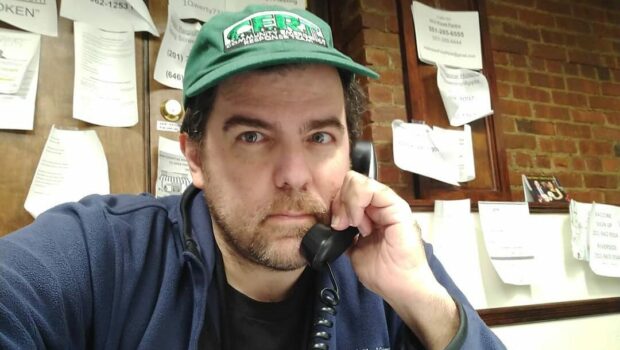
COVID HOTLINE, HOW CAN I HELP YOU?: My 14 Months Volunteering for Hoboken CERT in the City Hall Basement
by Jack Silbert
In mid-March 2020, I’d just come off two weeks in the phone room at radio station WFMU for their annual fundraiser. So answering calls and providing information about COVID-19 for Hoboken residents and employees seemed a natural transition. Commander Brian Onieal informed us that our Community Emergency Response Team (CERT) had been activated by the Office of Emergency Management, first to hand out safety flyers by the PATH station, and then to man a call center from the City Hall basement conference room and assist with the Food Pantry.
I’m a sergeant in Hoboken CERT. I’d learned about the organization back in 2012, volunteering after Superstorm Sandy. Helping protect the town that had been my home since 1994 seemed pretty cool. We provided extra eyes and ears during large events (July 4, Arts & Music Festival, etc.) but I liked the real emergency stuff, like staffing a warming center overnight in a snowstorm, so people had a safe place to sleep. But my own troubles about 5 years ago—infection leading to double below-knee amputation and prosthetics—sort of curtailed my volunteer activities. Handing out flyers, working at the Food Pantry, anything involving a lot of standing, wasn’t ideal for me.
Sitting in a chair and answering phones, now that I could do. It was the first deployment since my disability that I could fully participate in, and that felt good. Not that there was much to do initially, as there wasn’t yet any COVID testing in town, and vaccines weren’t even a consideration. But we did begin a task that served us well over the next 14 months: calming down people who were nervous, anxious, upset, sad.
There were about 40 of us rotating through the shifts of the originally 12-hour day, 7-day week at the call center, gratefully accepting donated PPE, and also working at, and delivering for, the Food Pantry. Walking home in the dark through the practically deserted streets of Hoboken—these were curfew days—I felt that same kind of emotional exhaustion and loneliness I’d felt in the days after Sandy. But, you try to get a good night’s sleep, wake up, and do it all over again.
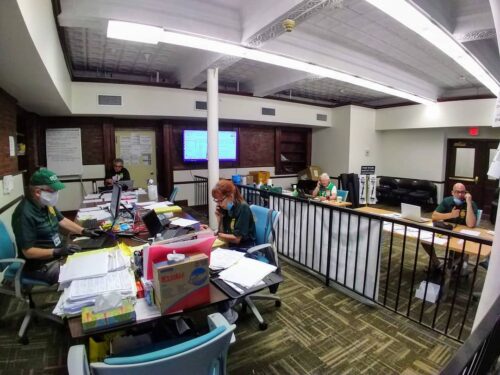
That part was kind of Freaky Friday for me. I’d been freelancing from home since 2012, making my own hours, rarely wearing pants. Now, the world was upside down: Almost everyone I knew was lounging around at home, while happy-go-lucky me was showering, shaving, getting dressed, heading to “work,” and later falling asleep in front of the TV. I’d become a normie!
Covid testing soon started up, but online registration was a long way off. So we asked callers a series of questions—symptoms, travel, contact, pre-existing conditions. If they qualified, we took down their information—first on paper and soon in a database we built—and passed it along to Riverside Medical Group, who did the actual appointment scheduling.
Taking calls from the community, we really interacted with every sort of person. The majority were polite and appreciative. Others were… not. Angry people. Rude. People who’d talk down to us. Those who’d call multiple times, hoping to reach a different representative and get a different answer. (Uh, no.) People disagreeing with facts. There were lonely folks who just wanted to talk; for that I was always glad to oblige.
It’s a small town so sometimes you’d recognize a name on the caller ID. Or, hey, isn’t that a CNN correspondent? I had a nice exchange with retired baseball All-Star Carlos Peña. A little kid crank-called me; something about my butt.
As spring became summer, volunteer attrition set in, as many people had to return to their actual jobs. Luckily, I don’t have a job, hooray! But the many volunteer hours really wore me out, and I wasn’t getting any writing done. I stopped going to physical therapy, thinking I’d start again when the call center closed in… July? September? Ever?
The summer brought a different type of caller: extremely entitled. Since the beginning, we’d dealt with name-droppers: I’m so-and-so’s cousin, person X told me to call, etc. (We never played favorites.) But as case numbers dropped and people felt more comfortable venturing out of their apartments, we got a lot of “I have a flight to Bermuda so I need to get tested TODAY” calls. (Well, see, it doesn’t work that way.) We did our best to accommodate everybody but it was feeling less like an emergency and more like a travel agency.
This ramped up during the holidays as simply everyone had to visit their families. (But wasn’t the recommendation to stay home, and not infect your parents and grandparents?) Plus, via Google results and News 12 New Jersey, our phone number became associated with the much-in-demand rapid testing, without the specification that it was only for residents and employees. So we routinely received calls from all over the tri-state area. We kept a growing list of testing sites and phone numbers in other cities.
For many callers, English was not their primary language. We had a great offsite translation team who we tried not to overwhelm, so when possible we attempted to work things out with our clumsy middle-school Spanish.
Entering the new year, call volume dropped, so maybe we’d phase out the center…. Nope, now there were vaccines. And there’s a large chunk of the population that either doesn’t have internet access or lacks computer literacy. We put them on waiting lists. (You might recall that for quite a while, vaccine supply didn’t meet demand.) This delay led many to “I called long before my neighbor did, and they just got vaccinated but I still haven’t been scheduled” calls, and also the spread of misinformation, which we made every effort to combat.
Our hours ultimately decreased to 9am to noon, 4 days a week. And over the last half-year or so, our number of volunteers also dwindled to fewer than 10. I must give a shout-out to Captain John Dalton, Maggie Shields, and John Branciforte, dedicated throughout. We were quite a crew, lots of laughs, and I love the bond we formed. Sometimes we felt slightly underappreciated but, as Maggie put it, we truly helped a ton of people, in many cases going the extra mile, and that’s a really good thing.
By mid-May, vaccines were widely available, call numbers dropped precipitously, and we finally closed the hotline. It’s been a little strange adjusting to “civilian life,” so if anybody needs me to come over and answer your phone for a few hours, just let me know.
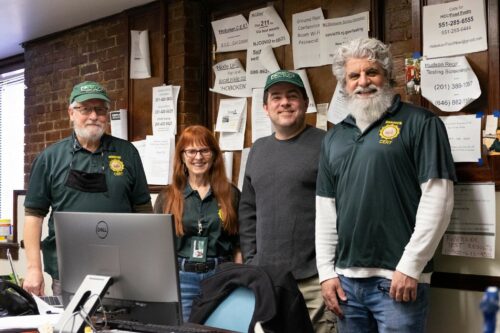
John Branciforte photo
***
CLICK HERE to learn more about Hoboken CERT.

 Previous Article
Previous Article Next Article
Next Article HO-BAKIN’, NJ—A Hard-Crusted Town With a Soft, Warm Center
HO-BAKIN’, NJ—A Hard-Crusted Town With a Soft, Warm Center 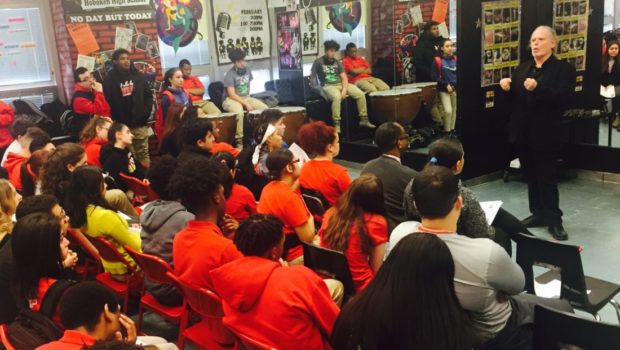 FORTUNE: Hoboken High School Honors Black History Month with Playwright George Cameron Grant
FORTUNE: Hoboken High School Honors Black History Month with Playwright George Cameron Grant 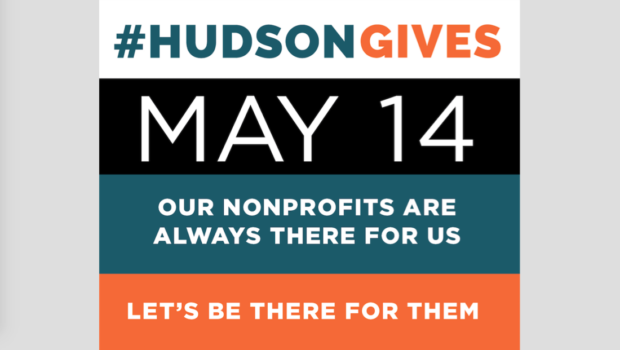 HUDSON GIVES: 75 Area Non-Profits to Benefit from Hudson County Chamber Online Fundraiser — THURSDAY, MAY 14
HUDSON GIVES: 75 Area Non-Profits to Benefit from Hudson County Chamber Online Fundraiser — THURSDAY, MAY 14  REGISTER TO VOTE: 2019 — Deadline Tuesday, October 15; Local Elections Are Where Your Vote Counts Most
REGISTER TO VOTE: 2019 — Deadline Tuesday, October 15; Local Elections Are Where Your Vote Counts Most 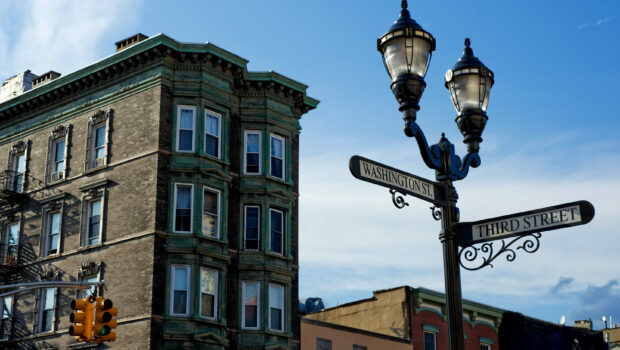 REINVENT: How Hoboken Small Businesses Can Pivot Their Strategy
REINVENT: How Hoboken Small Businesses Can Pivot Their Strategy 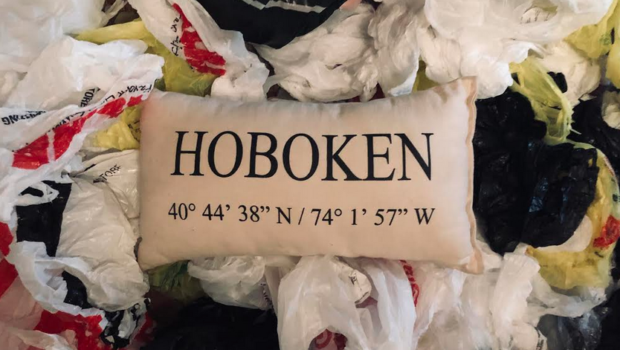 CARRY ON: Your Hoboken Plastic Bag Ban Survival Guide
CARRY ON: Your Hoboken Plastic Bag Ban Survival Guide 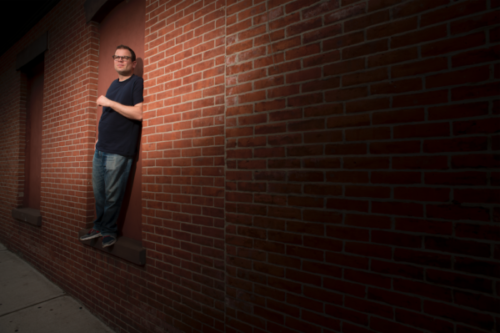 ADAM WADE: ‘LIVE AT THE MAGNET THEATER’ — Hoboken Humorist/Superstar Storyteller Releases His Second Album
ADAM WADE: ‘LIVE AT THE MAGNET THEATER’ — Hoboken Humorist/Superstar Storyteller Releases His Second Album  #BLACKLIVESMATTER: Estimated 10,000 Attend Peaceful March Through Hoboken — VIDEO
#BLACKLIVESMATTER: Estimated 10,000 Attend Peaceful March Through Hoboken — VIDEO